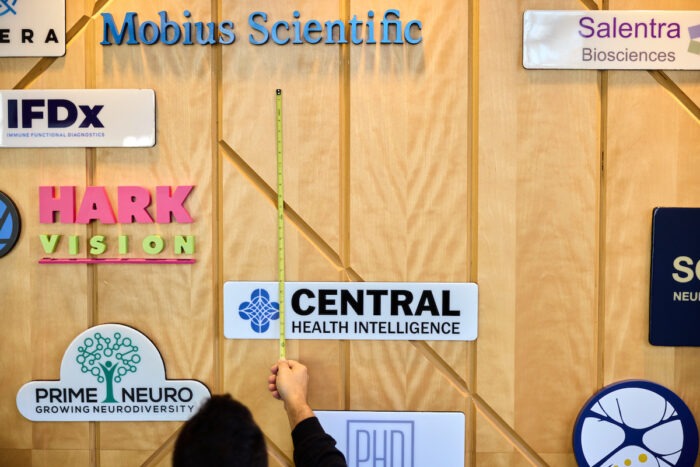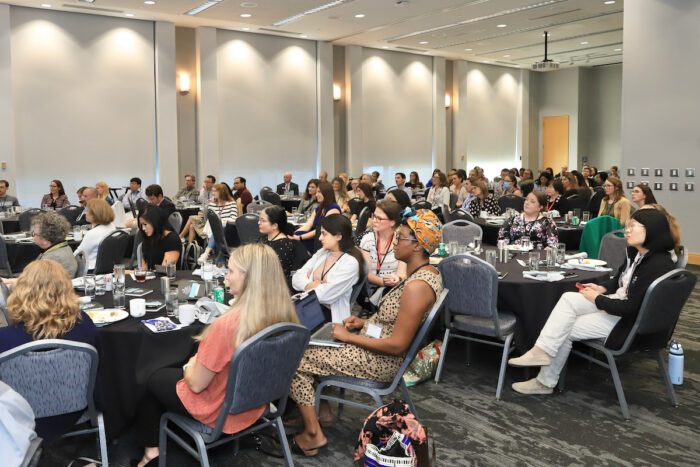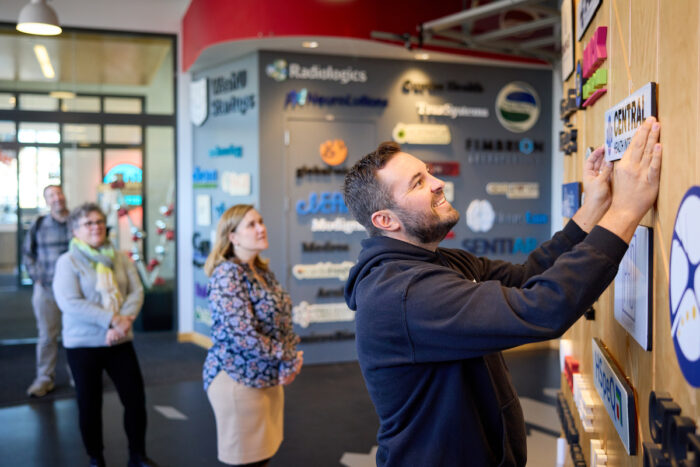University’s technology, innovation hub celebrates 100th faculty startup
Office of Technology Management fuels entrepreneurial spirit
 Matt Miller
Matt MillerThe first-floor walls at the Office of Technology Management (OTM) at Washington University in St. Louis are filled with logos of university startup companies. Recently, OTM celebrated a milestone of 100 Washington University startups.
The first-floor walls at 4240 Duncan Ave. – home to Washington University in St. Louis’ Office of Technology Management (OTM) – are running out of room. And that’s a good thing.
The logos of Washington University startup companies launched to shepherd promising university-owned diagnostics, therapeutics or other technologies to the marketplace are prominently displayed on the walls. A decade ago, the expansive walls had plenty of white space. But recently, OTM celebrated a milestone: Washington University’s 100th startup and counting. The walls are filling up.
Over the past three decades — but most notably in the past 10 years — OTM has worked proactively to help the university’s faculty researchers commercialize innovative technologies developed in their labs. By supporting faculty in spinning off their research into startup companies or licensing promising technologies to established pharmaceutical or medical device companies for further development, OTM aims to help Washington University innovations make it to the marketplace, for the benefit of society.
“Innovative ideas that are sparked in our academic labs hold immense potential for addressing the most pressing challenges in medicine,” said Nichole R. Mercier, PhD, assistant vice chancellor and OTM’s managing director. “One of our major initiatives at Washington University is commercializing our discoveries and getting them to the bedside to help patients. These first 100 WashU startup companies represent diverse industries and reflect the university’s commitment to fostering innovation and entrepreneurship. The companies and the technologies they’re developing are a great source of inspiration.”
The 100-plus startup companies that OTM helped take root are working to prevent, treat and diagnose cancers, neurodegenerative diseases, infectious diseases, and other illnesses. These companies are further developing faculty technologies into patient products, such as blood tests for detecting Alzheimer’s disease before symptoms develop, a brain-computer interface that helps restore motor function in patients suffering from devastating strokes, and a nanoscale material that helps wounds heal, among numerous other technologies.
Partnerships involving Medical and Danforth campus scientists and physicians, for example, are creating cutting-edge technologies that impact the lives of patients with heart problems. Jennifer N. Silva, MD, a professor of pediatrics and of biomedical engineering who treats children with irregular heartbeats, partnered with her husband, Jonathan R. Silva, PhD, a professor of biomedical engineering with expertise in creating mathematical computer models, to understand the electrical circuitry of the heart. They developed an interactive 3D augmented-reality platform that offers a 360-degree view of a patient’s beating heart, helping to ensure the accuracy of the minimally invasive procedure performed to treat abnormal heart rhythms in children and adults with cardia arrhythmia. They founded the company SentiAR to bring the platform, CommandEP, to the bedside to help patients.
“That spirit of collaboration is fostered at Washington University,” said Jennifer Silva, who also has another startup company with Jonathan Silva, Excera, which uses augmented reality to improve ultrasound-guided bedside procedures, such as catheter insertions into blood vessels in the legs, arms or neck in patients undergoing long-term IV medication therapy, frequent blood draws and dialysis. “Our equal contributions were key to the founding and development of our companies, and OTM was very supportive as we took the steps involved in launching them.”
https://www.instagram.com/p/C3TUP8UOd22/
Central Health Intelligence, the 100th Washington University startup company OTM had a hand in establishing, is helping patients and families make end-of-life decisions. Combining their diverse expertise with the goal of bringing comfort to families are the company’s founders: data scientist and epidemiologist Randi Foraker, PhD, a professor of medicine; Patrick White, MD, PhD, the Stokes Family Endowed Chair of Palliative Medicine and Supportive Care, and director of the Division of Palliative Medicine; and internal medicine physician Nathan Moore, MD, of BJC Medical Group, who treats patients at Missouri Baptist Medical Center. Their technology predicts mortality risk in critically ill patients using health-care data collected during a patient’s first day of hospitalization. These data can help provide patients, their physicians and families adequate lead time to establish end-of-life care goals for patients at high risk of death.
Ideas become practical, real-world technology through a process that bridges the gap between academia and the marketplace. A promising discovery with commercial potential goes through a process with Washington University’s OTM, which helps faculty navigate the complicated concepts of intellectual property, licensing technology and launching startup companies.
“OTM provided the resources to file the original patents and helped facilitate connections with mentors who helped foster our innovation,” said Matthew MacEwan, MD, PhD, an assistant professor of neurological surgery.
MacEwan arrived at Washington University with an interest in how the human body interacts with implanted devices or materials. As a student in the Medical Scientist (MD/PhD) Training Program, he discovered a unique class of materials called synthetic nanofibers that interact with cells to support their rapid growth and proliferation. The size and architecture of the nanofiber materials were found to closely mimic the structure of human tissues, making them a promising engineered alternative when repairing soft tissues damaged by trauma or disease. He spun off the technology into a startup company that now has five FDA-approved products used by surgeons throughout the U.S. to treat surgical, traumatic and chronic wounds in patients ranging from severe diabetics to cancer patients.
Today, that company — Acera Surgical — is 10 years old and firmly rooted in St. Louis County with almost 100 employees across the U.S. MacEwan serves as chief science officer, directing the company’s ongoing clinical studies and introducing institutions and clinicians to the clinical and logistical advantages of engineered solutions for tissue repair.
“I never thought I would start a company,” he said. “But the technology was a significant improvement over what we had available in the hospital, and we knew it could have a meaningful impact on patient care. Along the way, OTM and key mentors within the St. Louis entrepreneurial ecosystem guided us through the process of forming a company around this technology. We continue to work with OTM today, and this partnership is partly the reason that surgeons and clinicians all over the country have access to this revolutionary technology for the treatment of complex wounds.”
For two decades, the number of Washington University startup companies created with OTM’s help didn’t exceed four per year. That changed in 2013; the number of newly launched startup companies each year has held steady at five to 10 over the past decade. Of note, about a decade ago, OTM started the Women in Innovation and Technology program to help tackle the under-representation of women in technology commercialization initiatives. Before 2014, none of the university startup companies were launched by women.
 Tina McGrath Photography
Tina McGrath PhotographyOTM is addressing this gap by educating female faculty on how to navigate the commercialization process and introducing them to resources within the St. Louis region, Mercier explained. The effort is working; the number of female faculty disclosing and patenting their discoveries and engaging in commercialization by licensing technologies or founding new startup companies is increasing. While there remains much room to grow, OTM’s first 100 startup companies include five that were founded by females.
A new group at OTM led by Karen Mullis, PhD, director of new ventures, aims to grow the number of startup companies even more, with a goal of reaching double digits yearly. The group will assist the university’s research community in navigating the process of launching ventures, to help researchers bring their ideas to market.
 Matt Miller
Matt Miller“The goal is to reduce barriers to startup formation and create strong companies,” Mercier explained. “We are focusing on being transparent about the process and intentional about preparing our faculty for the challenges associated with startup ventures, ranging from guiding them through the early stages to assisting in crafting high-quality pitches to secure funding. This effort extends to creating connections with investors and startup talent.”
The impact of OTM’s commercialization efforts includes 60 U.S. patents awarded in 2022, putting Washington University among the top 50 U.S. universities on the National Academy of Inventors’ annual list tracking such successes.
In addition to SentiAR and Acera Surgical, several other Washington University startup companies have achieved notable success.
Neurolutions, which brought to market a device that helps people disabled by stroke to regain significant control over their arm and hand function. The device, called the IpsiHand, received market authorization from the Food and Drug Administration in April 2021. Other Washington University startups have drugs and diagnostics in clinical trials, including Wugen’s cancer cell-therapy drugs. Precivity AD, a blood-based diagnostic test for Alzheimer’s disease developed by Washington University and manufactured by C2N Diagnostics, is commercially available in the U.S. SAGE Therapeutics, a biopharmaceutical company that targets central nervous system disorders, went public through an initial public offering in 2014. Disarm Therapeutics, a biotechnology company seeking to develop new therapeutics for patients with axonal degeneration, was acquired by Eli Lilly and Co. for $135 million in 2020.
As for OTM and the university, the crowded walls at 4240 Duncan are a visual testament to their dedication to innovation and commercialization.






